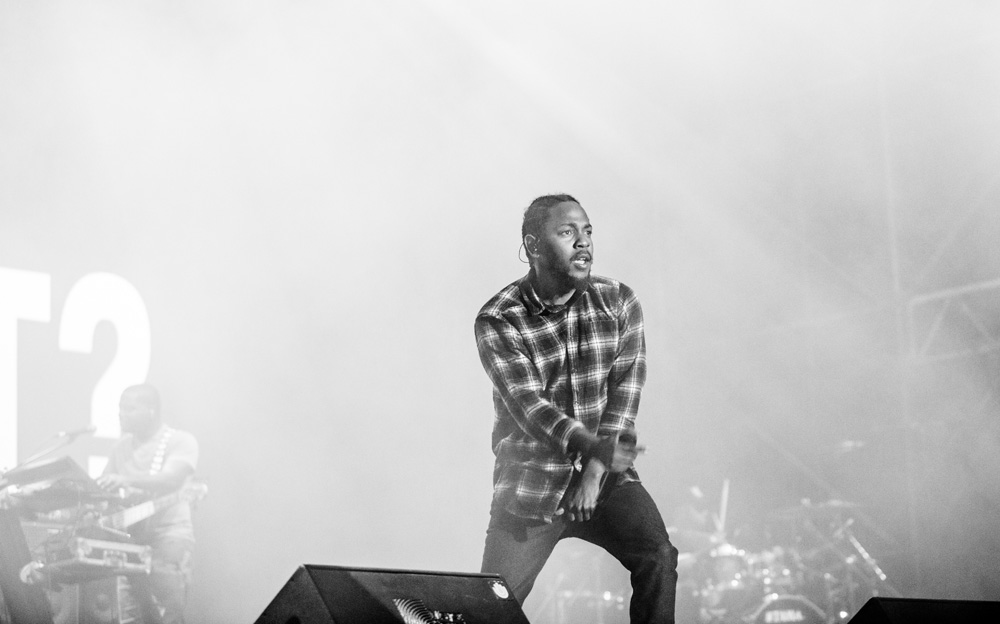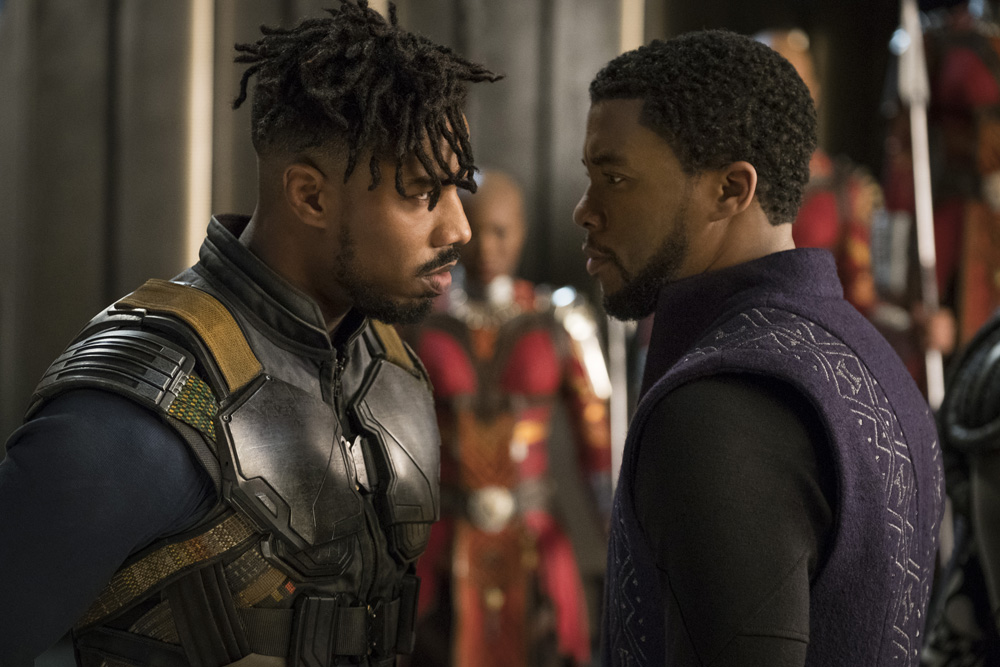It shouldn’t be surprising that music and film have a long and close relationship. They can strengthen each other (such as music videos or film scores) and influence each other (e.g. blockbuster biopics such as Straight Outta Compton or Bohemian Rhapsody). However, this post focuses on film inspiring music, specifically Kendrick Lamar’s Black Panther the Album: Music From and Inspired By. Not only is this album sonically phenomenal (seriously, it’s compiled of nothing but bangers) but it shares a really interesting relationship with the movie’s themes and motifs.
Directed by Ryan Coogler, Black Panther is a Marvel superhero movie that takes the fictional African nation of Wakanda as its central focus. It follows the newly appointed king T’Challa as he becomes the nation’s next Black Panther, struggling with outside powers who want to exploit their resource of vibranium (an extraordinary metal found only in Wakanda). Among many other things, the film deals with succession, identity, African culture and, through the complex character of Erik Killmonger, African diaspora.
When the album was first announced, Coogler commented that Kendrick’s ‘artistic themes align with those we explore in the film’. Undoubtedly this is true. Throughout his career the Compton-born rapper, sometimes known as Kung Fu Kenny, has used his music as a site of resistance to explore racism, inequality and gun violence. Nowhere is this clearer than his 2015 album To Pimp a Butterfly, with tracks such as ‘Alright’ and ‘The Blacker the Berry’ receiving praise for tackling complex racial issues of police brutality and heritage. He is a phenomenal live artist whose performances are frequently politically charged—take a look at his 2016 Grammy performance (you can thank me later). Therefore, when Coogler and his team were thinking about making ‘a soundtrack that was like a companion piece’, Kendrick seemed like a perfect fit… they weren’t wrong.

Black Panther the Album: Music From and Inspired By was produced and curated by Kendrick alongside his label Top Dawg Entertainment. Unsurprisingly then, the album features roster artists such as ScHoolboy Q, SZA and Jay Rock as well as less exposed South African artists such as Saudi, Sjava and Babes Wodumo. The latter three artists perform in Zulu, heard on ‘X’, ‘Seasons’ and ‘Redemption’, further fusing the album with themes and cultures found in the film.
All of the tracks are explicitly connected to the content of the film; characters are mentioned and leitmotifs are used throughout. Songs such as ‘Black Panther’, ‘Paramedic!’, ‘King’s Dead’ and ‘Seasons’ make direct references to T’Challa and Killmonger. ‘Paramedic!’ and ‘King’s Dead’ even seem to be from Killmonger’s perspective; the titles of both relate to the action in the film (Killmonger actually calls for a paramedic in his first scene in the museum). Also, towards the end of ‘King’s Dead’ the lyrics deal with absent fathers, reclaiming what is rightfully yours and overthrowing a regime—it has Killmonger written all over it.
Keen Black Panther fans will recognise a familiar leitmotif right at the end of ‘King’s Dead’: the ‘chu chu chu’ (or ‘yipping’) is associated with Okoye and the Dora Milaje. Kendrick’s companion album incorporates lots of these snippets from the original film score composed by Ludwig Göransson. Similarly, tracks from Kendrick’s album are played throughout the movie: ‘Opps’ (used in the car chase scene), ‘Pray for Me’ (used in the entrance scene to the Korean casino) and ‘All the Stars’ (used in the credits).

Hold up. Let’s just take a detour and talk about how Göransson’s score uses leitmotifs. For those new to the word, a leitmotif is ‘a recurrent theme throughout a musical or literary composition, associated with a particular person, idea, or situation’. To create these, Göransson actually travelled to Africa to study the cultures, instruments and compositions of traditional music. Black Panther the Album: Music From and Inspired By employs these leitmotifs throughout the tracks, almost like little Easter eggs.
T’Challa’s motif uses six ‘talking drums’, a West African instrument that can be played in a way that mimics human speech. As the king of Wakanda, the talking drums communicate T’Challa’s name. Listen out for it in the background of ‘Opps’ and at the end of ‘Bloody Waters’!! His antagonist, Killmonger, has a very different motif using another West African instrument called a Fula flute. In an interview for Variety, Göransson stated that ‘it sounded sad but also aggressive, energetic and impulsive […] it really resonated with the character’. The traditional flute soon gives way to a heavier trap beat, a nod to Killmonger’s upbringing in the USA, indicated by quick, firey hi-hats and pared down drums. Göransson translates this character, both his traditional ancestry and modern upbringing, into music… it’s just phenomenal! Listen out for a similar trap beat in ‘King’s Dead’ as well as the pared down drums in ‘Redemption Interlude’.
Marvel themselves noted that their collaboration with Kendrick ‘represents the first time in MCU history that Marvel integrated multiple original recordings created specifically for the film’. Consequently, the music of Black Panther, both the companion album and Göransson’s film score, is kinda groundbreaking. It represents a real move in the Marvel Universe towards recognising the importance of music in enhancing storytelling.
Catch Black Panther at this year’s Widescreen Weekend on Friday 11 October—it’s a treat for the eyes AND the ears!
Further reading (and viewing)
- Kendrick Lamar’s 2016 Grammy Awards performance (Vimeo)
- Black Panther director Ryan Coogler on Kendrick Lamar and taking inspiration from Blade (YouTube)
- ‘Black Panther Composer Infuses Score With Trove of African Sounds’, Jon Burlingame at Variety.com, 14 February 2018
- ‘Kendrick Lamar, Top Dawg, and Black Panther: The Album Soundtrack Lead Grammy Nominations’, Marvel.com, 7 December 2018
Black Panther is screening in IMAX 3D as part of Widescreen Weekend, our annual festival celebrating the past, present and future of film. Widescreen Weekend 2019 takes place between 10 and 13 October 2019.
One comment on “‘Wakanda Welcome!’: when Kung Fu Kenny met Black Panther”